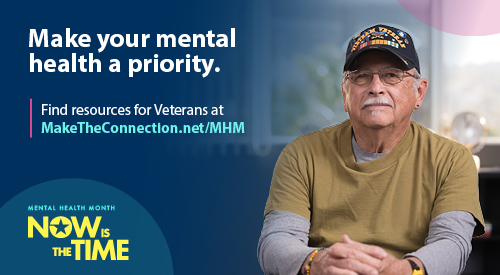
In May, VA recognized Mental Health Month, kicking off its “Now Is the Time” campaign for veterans facing mental health challenges. The poster above was created to urge veterans to seek help at the VA for any issues.
WASHINGTON — As the COVID-19 pandemic continues and scientists predict more periods of social distancing and quarantine in the future, healthcare leaders in the VA and elsewhere are beginning to prepare for how this will impact the mental health of veterans and civilians alike.
The worry is that social isolation, combined with the stressors of rising unemployment and health anxieties, could result in rising suicide rates, if efforts are not made now to support those in distress.
The 2019 National Veteran Suicide Prevention Annual Report noted that isolation has been shown to be a risk factor for suicide. Among VA patients, suicide rates have been highest among those who were divorced, widowed or never married and lowest among those who were married. Rates were also higher among individuals residing in rural areas.
Two ongoing VA studies are looking at how social isolation and community engagement can impact mental health and suicide. At the Portland VA, Jason Chen, MD, and colleagues are looking at whether creating a stronger sense of social connectedness in veterans who are high suicide risks could lower that risk.
There’s a dearth of research into understanding why veterans have difficulties making social connections. So in the first part of the study, Chen and his team investigated what might get in the way of veterans making and maintaining community connections. They interviewed 30 at-risk veterans to learn about their past experiences connecting with the community and what they felt might get in the way in the future.
While the team is still analyzing its data, early results show that veterans recognize the value of community and social interaction but desire more support in making those first initial connections with new people.
The second part of the study will examine ways that VA can provide that additional assistance, likely through a veteran peer support specialist—someone who has undergone their own mental health recovery and is using that experience to help other veterans through theirs. Chen’s end goal is to develop a toolkit that VA and others can use to increase social connectedness in veterans.
At the University of Texas in San Antonio, clinical psychologist Sandra Morissette, PhD, has just begun a VA-funded study to examine how social distancing specifically during COVID-19 will affect the mental health of veterans.
Morrisette’s previous work has focused on social connectedness, PTSD and suicide risk, and how those things interact with each other. Her previous research has demonstrated a strong protective link between social support and suicide, and that, even when veterans had high PTSD symptoms, they had less suicidal ideation when surrounded by high perceived social support.
In a time of self-imposed isolation, that support might be difficult to find. This newest study will look at just how deeply social distancing during COVID-19 is impacting at-risk veterans in the hopes of informing how suicide prevention is approached.
VA is also examining whether private business might be a source of ideas for innovative ways to prevent veteran suicide. Last month, the department put out a request for information (RFI) asking small businesses if any would be interested in participating in a Suicide Prevention Grand Challenge Competition. The goal of the global competition would be to develop a marketplace of evidence-based suicide prevention tools.
The RFI also noted that VA would be soliciting for a contractor to build and oversee the competition and asked for input on what that solicitation should look like.
In the meantime, VA is prepping for an expected increase in mental healthcare needs among veterans. Last month it kicked off its “Now is the Time” campaign. The goal of the campaign is to let veterans and their families know what mental healthcare resources are available to them. Because of the pandemic, many of these resources have been moved online, and VA is emphasizing distance treatment and telehealth.
Legislators are seeking to make immediate suicide support easier to access for veterans and civilians alike. Last month the Senate passed a bill to designate a three-digit phone number as a national suicide and mental health crisis hotline. If the legislation becomes law, 988 will become the suicide prevention equivalent of 911. Anyone dialing the number will be routed to the National Suicide Hotline. Veterans will be prompted to dial 1 after 9-8-8 and will be forwarded to the Veterans Crisis Line.
The reasoning behind the bill is that people in distress may have difficulty remembering 10 digits, and may not be able to look those numbers up quickly. As of last month, the House version of the bill was still in committee.
